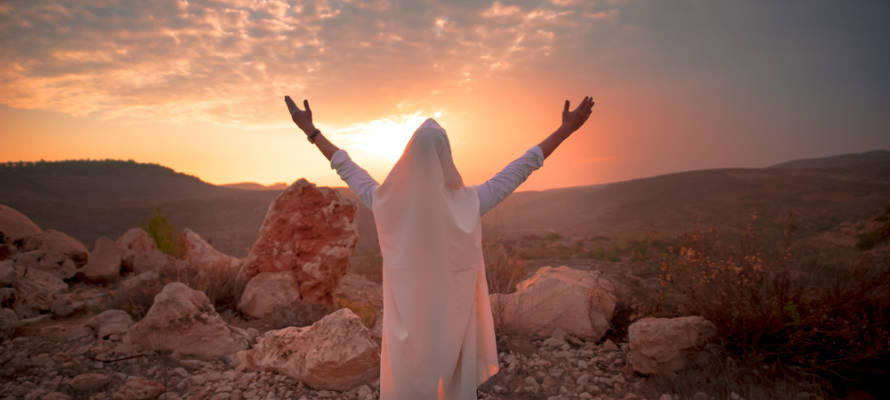Yes, we have to pray when things are going bad…but we have to keep up the same momentum even when things are going good!
By Rabbi Ari Enkin, Rabbinic Director, United with Israel
This week’s Torah portion is “Va’era” (Exodus 6:2 -9:35) and in it we read about seven of the ten plagues that God sent upon Egypt. The commentators note that following the plague of frogs, the Torah says, “[A]nd the frogs died – from the houses, from the courtyards, and from the fields. They piled them up into many piles, and the land stank. Pharaoh saw that there had been a relief [from the most recent plague], and kept hardening his heart. He did not listen to [Moses and Aaron], as God had spoken.” [Ex 8:9-11]
The commentators ask why the expression ““Pharaoh saw that there had been a relief [from the most recent plague]” only following the plague of frogs, and not after the other plagues. It is odd considering that after each plague had concluded there was “relief” from that most recent plague. Why is it only written in connection with the plague of frogs? Why don’t we see such comments anywhere else?
It is explained that when every other plague ended, it was gone. There were no signs of the plague ever having existed. But the plague of frogs was different. When the plague of frogs ended, all the frogs died right where they were. Imagine the stinking rotting smell of zillions of dead frogs everywhere! Indeed, the Torah goes out of its way to tell us how Egypt stank. Hence, even when the plague of frogs ended, it didn’t truly end. There were “aftershocks” that the people had to endure, as well: the smell.
Now get this. It is noted that the Hebrew for “Pharaoh saw that there had been a relief [from the most recent plague]” is “Vayar Pharoah ki hayta harvacha.” Although we have translated the word “harvacha” as “relief,” it can also be translated as “wide open spaces.” And maybe it can be translated in both ways in this passage. Let’s see.
It is explained that when there is a bad smell in an area, the smaller the space, the more dominant the smell is. The wider and more open the space is, the less influence that the smell will have. With that in mind, we can revisit the above quoted verse with the following translation “When Pharaoh saw that there was a wide open space [somewhere in the countryside] that he could escape to for relief [so that he wouldn’t have to bear the smell] he kept hardening his heart. He did not listen to them, as God had spoken.”
This is the type of person Pharoah was. He was set in his ways and wasn’t interested in any prophet or God trying to change him. He was humbled during the plagues, but once the plagues were over, it was “Moses, who?” No more locusts? Great! No more darkness? Super! Let’s get back to it!
Here’s where the plague of frogs was different. The plague remained in the form of stinking and rotting frogs even after the plague formally ended. But as long as Pharaoh was able to find some kind of relief, by relocating his office to the countryside until the Egyptian Janitorial Society cleaned up the frogs, he was back to his old ways.
Unfortunately, many of us are accidental Pharaohs when things are going good. When faced with troubles and challenges, we’ll pray, pray, pray. We’ll do more mitzvot. We’ll be better people. But as soon as our prayers are somewhat answered, as soon as things go back to normal, we go back to our old ways. The prayer isn’t so serious. The mitzvot aren’t as numerous as they were.
It’s reminiscent of the old joke about a man who can’t find a parking space at the mall. As he drives around, he begins to desperately pray to God, “Please God, if you find me a parking spot I promise I will go to synagogue every Saturday, put on tefillin every day, and get new mezuzot for my doors!”
A moment later the man sees a parking spot open up right next to the entrance of the mall. He gasps and heads toward it. “Never mind God. Found one!”
Yes, we have to pray when things are going bad…but we have to keep up the same momentum even when things are going good!
For more insights by Rabbi Enkin, on this week’s Torah portion, click on the links below.
https://unitedwithisrael.org/living-torah-what-does-judaism-say-about-magic/
https://unitedwithisrael.org/living-torah-dont-whack-the-frogs/
https://unitedwithisrael.org/living-torah-rejoice-over-the-success-of-others/
https://unitedwithisrael.org/living-torah-the-importance-of-prayer/
Bring Joy to Israeli Soldiers - Send Winter Care Packages!
We are honored to thank the young men and women of the IDF who risk their lives every day to defend the citizens of Israel.
Join us in sending winter care packages and personal notes of support to Israeli soldiers who are out in the cold all day.
Warm up a soldier's heart with essential winter wear including fleece jackets, hats, gloves and more. Keep an entire unit warm!
THE SOLDIERS REALLY APPRECIATE YOUR LOVE AND CONCERN!
Click Here to Send Your Gift and Personal Note to Israeli Soldiers

